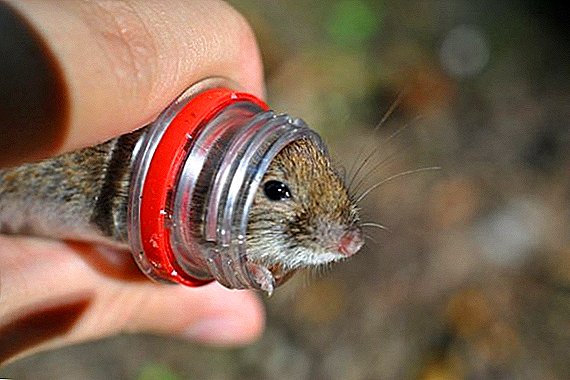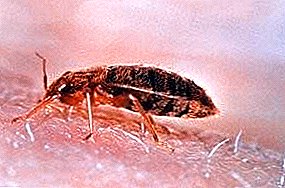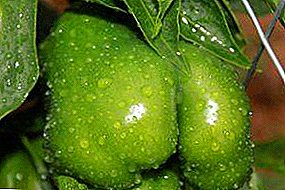 Excellent appetite, characteristic of ducklings, does not guarantee that they will grow without problems, confidently gaining weight and rapidly approaching the period of maximum egg production. All this is simply impossible to achieve without vitamins, the lack of which can not always fill the standard duck food. What kind of vitamins do ducklings need and how to provide them with them will be discussed in the article.
Excellent appetite, characteristic of ducklings, does not guarantee that they will grow without problems, confidently gaining weight and rapidly approaching the period of maximum egg production. All this is simply impossible to achieve without vitamins, the lack of which can not always fill the standard duck food. What kind of vitamins do ducklings need and how to provide them with them will be discussed in the article.
The benefits of vitamins for ducklings
In the summer, with an abundance of green food and especially aquatic vegetation, the ducklings quite fruitfully saturate their bodies with the elements necessary for their growing organism.
However, the situation is much worse in early spring and in the autumn-winter period, when the amount of green mass decreases sharply, as does the number of hours of sunshine.  But especially important is the intake of chicks in the body of vitamins at the very young age, regardless of the season. These substances contribute to:
But especially important is the intake of chicks in the body of vitamins at the very young age, regardless of the season. These substances contribute to:
- preservation of livestock ducklings, reducing their death as much as possible;
- protect them from diseases not related to infections;
- normalization of metabolic processes;
- prevention of beriberi and seizures, as well as diseases of rickets, joint thickening and dystrophy;
- improve feed digestibility.
Did you know? Currently, only 13 substances are assigned the title of vitamin and a few more are on the way to this status.
Natural vitamins
For the chicks, the richest source of these substances is green fodder and full solar illumination, which promotes the synthesis of vitamins in the chicks.  However, for more rapid growth of the young, strengthening their health and preventing diseases, additional feed is needed, which contains vitamins, of which there is not much green. This feed is a variety of natural products.
However, for more rapid growth of the young, strengthening their health and preventing diseases, additional feed is needed, which contains vitamins, of which there is not much green. This feed is a variety of natural products.
Fish flour
This product, which consists of more than half of high-quality proteins, also contains most of the elements from vitamin B, as well as vitamins A and D. In addition, fish meal is saturated with phosphorus and calcium, which are necessary for the development of chicks.
You must agree that if you don’t have time to figure out how to feed the ducklings, then you can’t even count on a qualitative gain. Read about how to feed the little ducklings.
In the diet of ducklings fish meal should occupy about 7% of the total amount of food. From it boil broths, which prepare the mash, or simply add to the rest of the food. 
Carrot
This vegetable is rich in carotene, which is able to transform in the body into very valuable vitamin A. Most of the common vitamins are present in carrots, and there are also relatively high concentrations of such vitamins as K and PP.
Carrots are fed to the ducklings fresh and dried, salted and silage. This product is so important that in ducklings starting from three days of age, it makes up from a quarter to a third of the total daily ration of chicks. 
Pumpkin
Also contains carotene, converted into high-value vitamin A, and takes pride of place in the diet of ducklings. Vitamin B2 is present in significant quantities in the pumpkin with other members of group B, as well as, among others, rare vitamins T and E.
Pumpkin is rich in minerals:
- calcium;
- phosphorus;
- zinc;
- magnesium;
- iron.
 This vegetable is given to chicks when they reach five days of age, for which it is ground. In the menu of chicks, pumpkin takes up to 20% of the daily amount of dry feed.
This vegetable is given to chicks when they reach five days of age, for which it is ground. In the menu of chicks, pumpkin takes up to 20% of the daily amount of dry feed.Did you know? Having hatched from an egg, the ducklings are ready to recognize as their mother the very first creature they see, be it a man, a dog, or even a cat.
Sugar beet
It is saturated with sucrose (up to 20%), fiber, nitrogenous substances, minerals in the form:
- iodine;
- phosphorus;
- gland;
- potassium;
- calcium.
 Also, the vegetable contains vitamins:
Also, the vegetable contains vitamins:- group B;
- ascorbic acid;
- PP, E;
- provitamin A;
- folic acid.
Poultry farmers should consider all the details of growing ducklings in an incubator.
Swede
This vegetable is especially rich in vitamins A, B9 and E. In addition, it contains many other elements from vitamin B, as well as vitamins PP, H and C.  Along with the minerals in the form of iron, potassium, magnesium and sodium, calcium plays a special role in the successful growth of ducklings, which is quite abundant in swede.
Along with the minerals in the form of iron, potassium, magnesium and sodium, calcium plays a special role in the successful growth of ducklings, which is quite abundant in swede.
The swede has a valuable property not to lose vitamins and other nutrients during heat treatment, so it is very convenient to add it to ducklings in feed as it is boiled. Swede can take up to 10% of the daily norm of grain mixture.
You, for sure, will be useful to learn about the rules of feeding ducks at home, and in particular musk ducks, as well as read about how to prepare their own feed for ducks.
Potatoes
This extremely starch-rich carbohydrate food is perfect for the ducklings' digestive system. Vegetable contains most of the substances of group B, as well as vitamins E and A. In the presence of vitamin C, potatoes are on a par with citrus fruits.
Also in this product there are more than a dozen mineral elements with a predominance of potassium, phosphorus and chlorine.  When ducklings reach ten days of age, they are given boiled potatoes, which can make up to 20% of the total daily amount of grain mixture.
When ducklings reach ten days of age, they are given boiled potatoes, which can make up to 20% of the total daily amount of grain mixture.
Important! Unlike sugar beets, the water in which potatoes were boiled cannot be added to ducklings' food because of the presence of solanine harmful to them.
a piece of chalk
On the fourth day of life, ducklings are given chalk in their diet. This mineral is an excellent source of calcium, without which a complete growth of the bone mass of chicks is impossible.
Chalk in the form of a hammer can be added to the mash, and in a finely divided state they are filled with special feeders. 
Crushed shell
Ground shells are also an excellent source of calcium in the body of chicks. In addition, they, getting into the stomach of a duckling, help him process food.
Like chalk, crushed shell is added to the mash. 
How to give vitamin supplements to ducklings
Extremely useful for the most effective feeding of young premix, that is, a mixture of bioactive components that enrich the combined feed. Vitamin-mineral supplements as premixes optimize the intake of these nutrients into the body of the chicks.
It is known that ducklings like to drink food with water, so drinkers should always be near the feeders. Get acquainted with the features of making drinkers for ducklings with your own hands.
"Sun"
As part of this vitamin and mineral supplement a whole bunch of vitamins:
- BUT;
- IN 1;
- AT 2;
- IN 3;
- AT 4;
- AT 5;
- Sun;
- AT 12;
- WITH;
- D3;
- E;
- N.
 Presented in the "Sunshine" as macro-and micronutrients in the form:
Presented in the "Sunshine" as macro-and micronutrients in the form:- copper;
- gland;
- zinc;
- iodine;
- Selena;
- cobalt;
- manganese;
- calcium.
Based on the daily use rates associated with the age of birds, which are indicated on the packaging of the product, a vitamin and mineral supplement is added to the feed for poultry.
As a result of the reception of the premiere "Sun" ducklings demonstrate:
- increased survival rate;
- accelerating growth and development;
- disease resistance;
- high-quality metabolism.
Video: feed "Sun"
"ProCorm"
This tool is a food intended for the young of all types of poultry from the very first hours of its life.
"ProKorm" consists of:
- high quality grains;
- milk proteins;
- animal and vegetable fats;
- lysine and methionine amino acids;
- enzyme complex.
 This feed is widely represented vitamins:
This feed is widely represented vitamins:- BUT;
- almost all from group B;
- WITH;
- D3;
- E;
- N.
- iodine;
- zinc;
- iron;
- calcium;
- manganese;
- copper;
- cobalt;
- selenium;
 The use of this tool as feed for ducklings allows you to:
The use of this tool as feed for ducklings allows you to:- bring the safety of young stock to 98-100%;
- achieve accelerated and harmonious growth of chicks;
- reduce the time of rearing;
- strengthen the immunity of ducklings;
- prevent disease.
Unfortunately, it is very difficult to eliminate all possible causes of the appearance of ducklings. Find out how ducklings can get sick.
"Rich"
This vitamin-mineral complex is designed to add to the feed of young. In the premix are the same vitamins and micro-and macronutrients, as in the media, which were discussed above.
It especially emphasizes the lack of hormonal growth stimulants in the complex. Moreover, the composition of the premiere "Rich" is arranged in such a way that it is able to effectively rid the body of chicks from harmful elements represented by toxins, radioactive substances, heavy metal salts and carcinogens.  Premix is designed for chicks from the first days of their lives. It is recommended to do this in the morning, adding a means to fresh food.
Premix is designed for chicks from the first days of their lives. It is recommended to do this in the morning, adding a means to fresh food.
Important! In order that the vitamins are not destroyed, the agent must be added only to the cooled down food.
The addition of this vitamin-mineral complex in bird food gives the effect in the form of:
- real reduction in chick mortality;
- improve their metabolism;
- health promotion ducklings;
- increasing disease resistance;
- increase in digestibility of feed consumed by chicks, which leads to a noticeable cost savings.
"Siberian Compound"
This vitamin-mineral concentrate, intended for young poultry, contains all the most important macro-and micronutrients in the form of:
- magnesium;
- phosphorus;
- calcium;
- sodium;
- manganese;
- potassium;
- Selena;
- cobalt;
- gland;
- iodine;
- copper;
- sulfur;
- zinc.
 Naturally, it is represented in the vitamin complex and almost all the elements of the vitamin B group, as well as the beneficial substances A, D3 and E.
Naturally, it is represented in the vitamin complex and almost all the elements of the vitamin B group, as well as the beneficial substances A, D3 and E.Concentrate is used as an addition to the daily diet of young animals in the amount of 1% of the total mass of the feed.
As a result, the chicks, in addition to all the other benefits of using vitamins and minerals, are able to:
- to optimize the development of the reproduction system;
- to ensure the growth of future egg production;
- accelerate the achievement of the necessary meat condition.
Vitamins, no matter how they reach the body of the chick, guarantee him good health, active growth and a comfortable life. In addition, there are many ways to saturate the diet of chicks with these substances.












